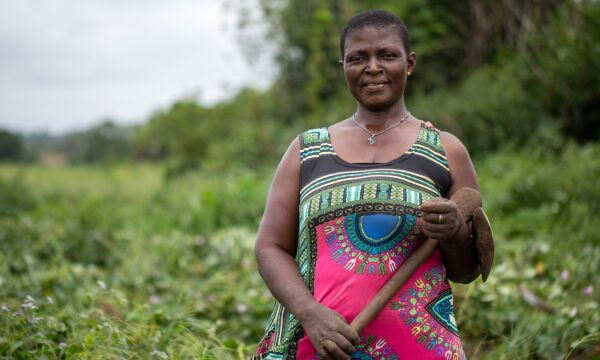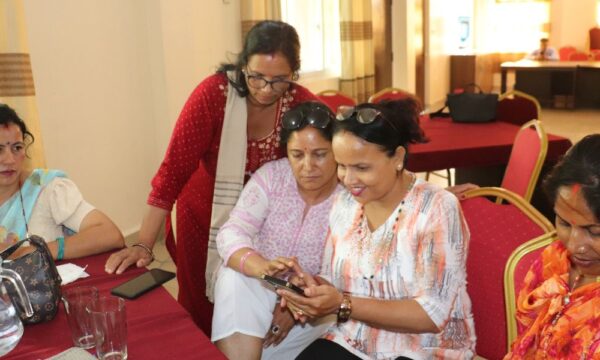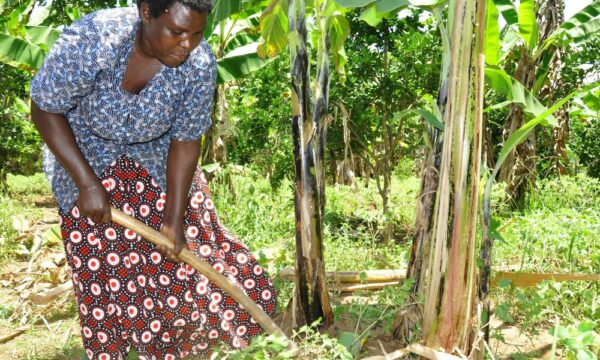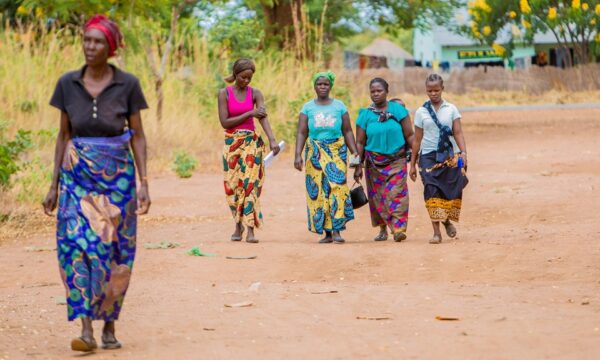Male champions of gender equality are helping to empower women in Zambia. Meet Sibajene Mudenda – an agricultural economist with the Zambia Agriculture Research Institute (ZARI). He is a strong advocate of women’s empowerment and a male champion of gender equality. Until now, he has concentrated on applying technology in agriculture. But recently, to complement his role, he turned his attention to addressing the constraints that women farmers face in accessing that technology in Zambia.

When it comes to agriculture, Sibajene noticed how women play different roles in farming compared to men. While men often hold positions of power, women do not. They struggle to access knowledge, opportunities, and resources, such as credit, inputs, and land. They receive less education, juggle care work and household chores with farm work, and earn lower incomes from unskilled labour.
Sibajene says this marginalization stems mostly from social norms. Addressing the imbalance made him want to become a male champion of gender equality. He says men must start including women in decision-making and become advocates of women’s empowerment themselves. In this blog, we ask him about his work and the ways in which male champions of gender equality can make a tangible difference for women farmers in Zambia. The interview was conducted as part of PlantwisePlus’ work on Gender Technical Working Groups.
The importance of having male champions of gender equality
Often, the decision-makers in communities or societies are men. Sibajene noticed a common denominator – while men typically have power and access to resources, women do not. It is critical that we have male champions of gender equality in order to change this. If we can include more men as advocates of gender equality, we can build a positive trajectory towards women’s participation in decision-making. This could lead to more gender mainstreaming along the entire value chain.
“If more men appreciate the significant role that women play in agriculture, and how much women can achieve when they’re given equal access and rights to opportunities, the sky is the limit.”
Approaches male advocates can use to support gender equality
So, what can male champions of gender equality do to bring about change? There are many approaches they can take when it comes to women’s empowerment. Sibajene highlights the importance of focusing efforts at multiple levels in society – from governments to communities.
Sibajene says, “We need to work at different levels. At a policy level, we need decision-makers to be well informed about the significant contribution that women make to the development of the economy and the progression of agriculture and development. At the grassroots level, we need local community leaders to take into account women’s empowerment in leadership roles.”
In local communities, Sibajene also explains that men working in extension can help to create the right environment for women to share their needs and wants. If you want to understand a problem in a community, and you ask about the actions that could help, you will mainly hear men’s voices. Largely, the women remain silent. This is down to social norms. One approach, therefore, is to create platforms where women are able to raise their voices separately from men. By addressing women on their own, we can really listen to what they need and want to say.
Sibajene also describes very practical approaches that male champions can take, such as daily calendars. Using them, we can ensure we understand how women spend their time and what roles they play in agriculture. Then we can discover how best to empower them. Women still spend a great deal of their time caring for families, and we cannot change that overnight. However, by understanding their day-to-day routines, we can discover how and when to reach them with the extension advice they need.
Facing challenges – how male champions of gender equality can overcome hurdles
Sibajene notes that one of the biggest challenges that male champions of gender equality face is changing mindsets. Even when it comes to technology, it takes time to change people’s minds about using new ones. The same applies when we want to change people’s minds about gender equality. It takes time. Creating that change in mindset can be affected by behavioural and cultural factors. Some methods work faster in some communities and slower in others.
Another challenge is policy development at the institutional level. How much does policy recognize gender mainstreaming in society? Moreover, how effective can it be? Take the case of Zambia, for example.
“We have a national policy with the clear aim of empowering women and increasing their access to opportunities and resources. It’s something we continue to work towards. However, barriers and challenges exist when it comes to increasing awareness – cultural and social norms among communities are still strong,” says Sibajene.
The benefits that come from men’s participation in gender equality
There are many tangible benefits to having more male champions of gender equality. Sibajene describes, for example, how they can help to drive gender mainstreaming. This helps women to see concrete benefits such as access to credit, inputs, and land. He notes how they struggle to access investment, in particular. He explains how male champions can help women, especially rural women, to have the confidence to walk into a financial institution and present a business plan.
Another benefit is seeing more women hold decision-making roles across the entire value chain. At present, you might see women in certain marketing roles, but they are often not the ones with business access to markets. Market access remains male-dominated. This happens because men hold key decision-making roles . One benefit of having more male champions would be empowering women not only at the food production level, but also the sales level – the end of the value chain. If we have more male champions of gender equality who drive women’s empowerment, we will begin to see tangible results in agribusinesses.
Sibajene notes that, “One part of the answer is that men, in this context, listen to men. I think that makes male champions of gender equality really important, because the community tends to listen to men.”
Working together for gender equality
Studies in several developing countries found that 43% of women working in agriculture only have access to 5% of advisory services. It raises a big question mark – why is this the case? Society is male-dominated, especially in the workplace. If more men throughout different layers of society appreciate the contribution that women make to farming, we could empower more women, and therefore, more communities. Empowering women is an approach we can use to empower many more people. The positive impact of empowering women extends far beyond the individual.
Women bring benefits to food production and, therefore, food security and income generation. If women had the same access to agricultural resources as men, it is estimated that farm yields could increase by 20-30%, potentially reducing the number of hungry people worldwide by 12-17%, according to UN Women. If we can bring the discussion about women’s empowerment into the circle of men, then we may find that walls come down and doors open for more female inclusion and participation in agriculture. This ultimately boosts economic growth for everyone. By including women, we benefit everyone. Male champions of gender equality have an important role to play.
Learn more about PlantwisePlus Gender Technical Working Groups here:
Empowering women farmers through Gender Technical Working Groups
Empowering women farmers in Pakistan with pest control knowledge
Related News & Blogs
Advancing gender-inclusive agricultural advisory services in Bangladesh
In Bangladesh, agriculture forms the backbone of rural communities. It employs nearly two-thirds of the workforce, many of whom are women. However, the sector faces significant threats from plant health challenges, including devastating crop pests such…
15 October 2025




